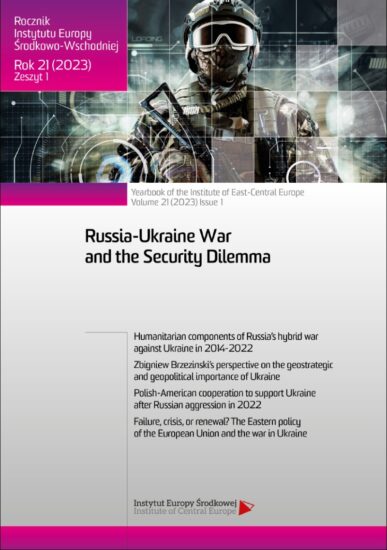The impact of political, military, and social factors on the repositioning of Belarus within the regional security architecture
ORCID: Taras Polovyi: 0000-0002-7908-6606
ORCID: Justyna Olędzka: 0000-0002-7037-277X
Afiliacja: University of Białystok, Poland
Pages: 185-207
Edition: Lublin 2023
DOI: https://doi.org/10.36874/RIESW.2023.1.12
Citation method: J. Olędzka, T. Polovyi, The impact of political, military, and social factors on the repositioning of Belarus within the regional security architecture, „Rocznik Instytutu Europy Środkowo-Wschodniej” 21 (2023), z. 1, s. 185-207, DOI: https://doi.org/10.36874/RIESW.2023.1.12
Abstract: The next phase of Russian aggression against Ukraine demonstrated that despite lacking a large military, territorial, population, or raw material potential, Belarus could play a significant role in the project to construct a new regional, continental, and even global security architecture. The purpose of this article is to discuss the problem of repositioning Belarus, which was affected not only by the multidimensional change in Belarusian-Ukrainian relations as a result of the war but also by long-term efforts to elevate Belarusian-EU relations. In this area, the fundamental research question is whether the war in Ukraine, the breach of the so-called Budapest Memorandum and the deepening of the multifaceted Russian-Belarusian integration within the Union State (including the militarisation of Belarus and the allocation of tactical nuclear weapons) will cause the projects for the redefinition of Belarus-EU relations (which are instrumental in reducing the intensity of political turbulence in the region) to disappear from the EU diplomatic agenda for a long time, with a direct negative impact on the future of European security. The article verifies the hypothesis that due to the specificity of the Belarusian authoritarian model, despite the systematically deepening Russian-Belarusian integration and the ever-expanding sanctions policy towards Belarus, (2) due to the shape of Belarusian-Ukrainian relations after 2014 and the periodically satisfactory Belarusian-EU relations, (1) there are still prospects for Belarus to pursue foreign policy diversification and repositioning of the European vector in it.
Bibliography:
1. Banasik M., The military integration of Belarus into the Russian Federation, “Safety & Defense” 2022, no. 8(1).
2. Czwołek A., Bliscy sojusznicy? Perspektywy pogłębienia integracji rosyjsko-białoruskiej po 2018 roku, “Nowa Polityka Wschodnia” 2022, no. 3(34).
3. Dekret Vysshego Gosudarstvennogo Soveta Sojuznogo gosudarstva 4 nojabrja 2021 g. # 6. Minsk – Moskva. Ob Osnovnyh napravlenijah realizacii polozhenij Dogovora o sozdanii Sojuznogo gosudarstva na 2021-2023 gody, https://etalonline.by/document/?regnum=ad2100022.
4. Diec J., Terytoria „buforowe” w stosunkach polsko-rosyjskich. Przypadek Białorusi. “Politeja” 2016, no. 6(45), DOI: 10.12797/Politeja.13.2016.45.12.
5. Dinamіka stavlennja ukraїncіv do svіtovih lіderіv, https://ratinggroup.ua/research/ukraine/dinamika_otnosheniya_ukraincev_k_mirovym_lideram.html.
6. Drakachrust Ju., “Lukashenko – gіbridnij sojuznik Ukraїni”. Shho dumajut’ v Ukraїnі pro vibori prezidenta Bіlorusі?, https://www.radiosvoboda.org/a/vybory-prezydenta-bilorusi-i-ukrajina/30700395.html.
7. Kłysiński P., Żochowski P., The reluctant co-aggressor. Minsk’s complicity in the war against Ukraine, OSW Commentary, https://www.osw.waw.pl/en/publikacje/osw-commentary/2023-02-10/reluctant-co-aggressor-minsks-complicity-war-against-ukraine.
8. Konstitucija Respubliki Belarus’, https://president.gov.by/ru/gosudarstvo/constitution.
9. Kubin T., W poszukiwaniu rezultatów…: Polityka Unii Europejskiej wobec Białorusi, “Studia Politicae Universitatis Silesiensis” 2013, no. 10.
10. Kuleszewicz A., Between Russia and the West: Belarus as a challenge for European stability and security, “Polish Political Science Yearbook” 2017, vol. 46(1).
11. Lang K.-O., Koopmann M., The EU and Belarus – a relationship with reservations in Belarus and the EU: From isolation towards cooperation, [in:] H.-G. Wieck, S. Malerius (eds.), Center for European Studies and the Konrad Adenauer-Stiftung, Vilnius 2011.
12. Liedekerke de A., Husieva O., Frankenthal K., Pitfalls and opportunities for an EU-strategy towards Belarus, “ISPK Das Institut für Sicherheitspolitik an der Universität Kiel”, Policy Brief, January 2022, no. 11.
13. Matsukevich P., Astapenia R., The Degradation of Belarusian foreign policy: A proposed course correction, Briefing Paper, December 2022.
14. Miadzvetskaya Y., “Code of Absence”: EU-Belarus legal framework, “European Foreign Affairs Review” 2022, vol. 27, issue 2.
15. Mironowicz E., Polityka zagraniczna Republiki Białoruś 1990–2020, “Biuletyn Historii Pogranicza” 2021, no. 21.
16. Myroniuk A., Leaked document reveals alleged Kremlin plan to take over Belarus by 2030, Kyiv Independent, https://kyivindependent.com/leaked-document-reveals-alleged-kremlin-plan-to-take-over-belarus-by-2030/.
17. Nowakowski J.M., Olędzka J., Rust M. (eds.), W dusznym uścisku brata. Relacje białorusko-rosyjskie, Studium Europy Wschodniej UW & Grupa Analityczna “Białoruś w regionie” 2021, https://studium.uw.edu.pl/wp-content/uploads/2022/01/Raport_Bialorus_2021_2PL.pdf.
18. O rossijskih proektah dokumentov po obespecheniju pravovyh garantij bezopasnosti so storony SShA i NATO, https://www.mid.ru/ru/foreign_policy/news/1790809/.
19. Olędzka J., The “Year of Truth” The Impact of the 2020 elections on the integration project of the Russian Federation with Belarus, “Romanian Political Science Review” 2022, vol. XXII, no. 1.
20. Shmatsina K., The prospects for Belarus in 2023 in the light of Russia’s war in Ukraine: The future is not set in stone, “SCEEUS Guest Platform for Eastern Europe Policy” 2023, no. 35, https://sceeus.se/en/publications/the-prospects-for-belarus-in-2023-in-the-light-of-russias-war-in-ukraine-the-future-is-not-set-in-stone/.
21. Soglashenie o merah obespechenija bezopasnosti Rossijskoj Federacii i gosudarstv-chlenov Organizacii Severoatlanticheskogo dogovora, https://mid.ru/ru/detail-material-page/1790803/.
22. Sostojalas’ vstrecha Vladimira Putina i Prezidenta Belorussii Aleksandra Lukashenko, http://www.kremlin.ru/events/president/news/27286.
23. Stavlennja ukraїncіv do Bіlorusі (ljutij–berezen’), 9 March 2023, https://razumkov.org.ua/napriamky/sotsiologichni-doslidzhennia/stavlennia-ukraintsiv-do-bilorusi-liutyi-berezen-2023r [10.04.2023].
24. Stępniewski T., Russia-Ukraine war: Independence, identity, and security, “Rocznik Instytutu Europy Środkowo-Wschodniej” 2022, vol. 20, issue 2.
25. Topolski I., Military presence of the Russian Federation in the Republic of Belarus, “Rocznik Instytutu Europy Środkowo-Wschodniej” 2022, vol. 20, issue 2.
26. Usov P., Evolution of the Belarus-Russia Union State: From integration to attempts of incorporation, “Studia i Analizy Nauk o Polityce” 2020, no. 1.
27. Wierzbicki A., Belarus and the EU – No common way in sight, [in:] W. Hilz, S. Minasyan, M. Raś (eds.), Ambiguities of Europe’s Eastern Neighbourhood, Springer VS, Wiesbaden 2020.
28. Wilk A., Russian Belarusian Army: Practical aspects of military integration of Belarus and Russia, Centre for Eastern Studies, 2021, https://www.osw.waw.pl/sites/default/files/Raport-OSW_Rosyjska-armia-bialoruska_net.pdf.
29. Włodkowska A., Europa Środkowo-Wschodnia jako obszar rywalizacji i wpływu. Ciągłość i zmiana w perspektywie 30 lat, “Rocznik Instytutu Europy Środkowo-Wschodniej” 2022, no. 4(20).

PDF: Download